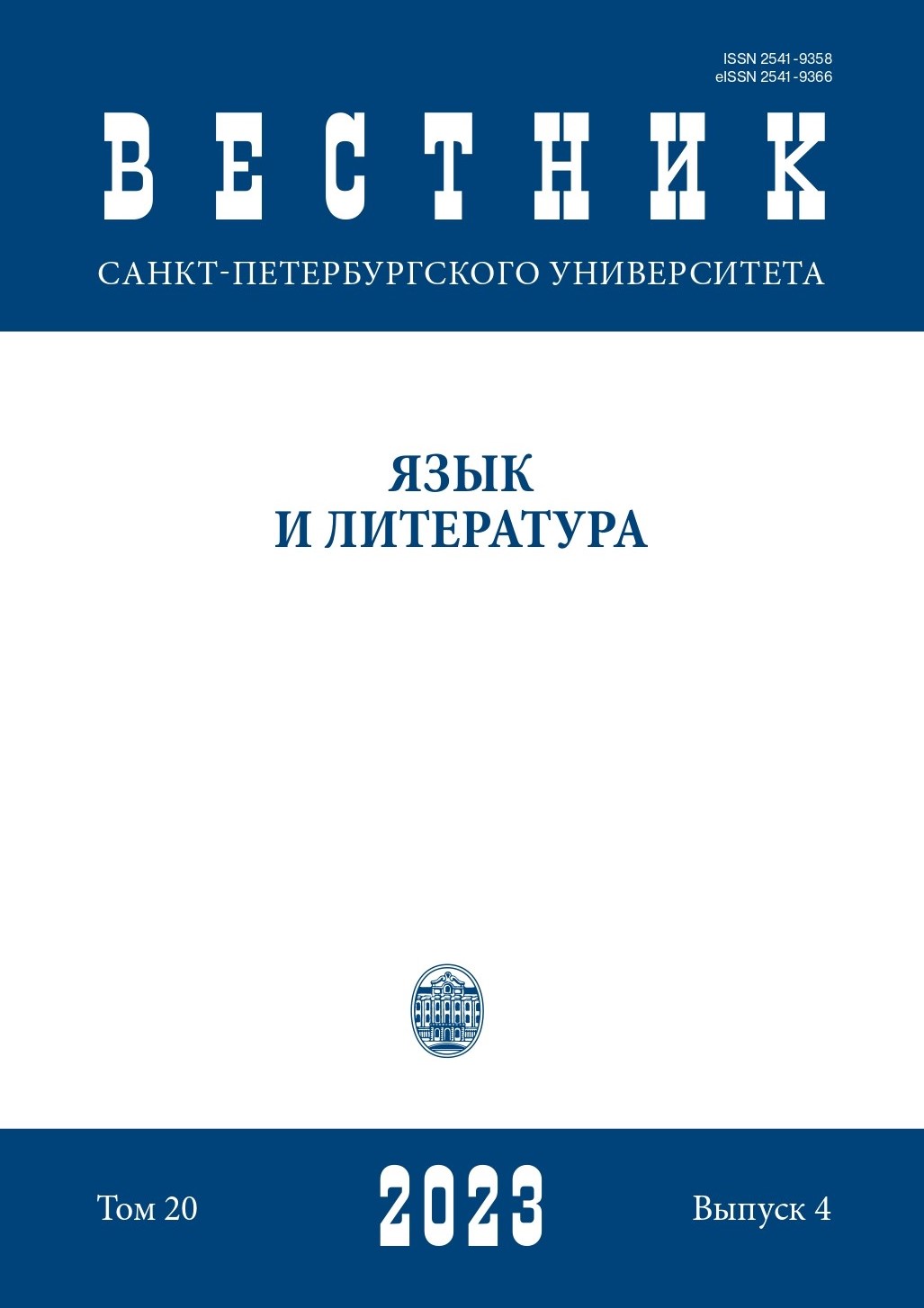The fluid meaning of femininity in modern contexts: Demure, celebratory, assertive
DOI:
https://doi.org/10.21638/spbu09.2023.415Abstract
The paper presents the analysis of the use of the noun femininity in a sample of 700 contexts drawn from four English language corpora: COCA, COHA, BNC, NOW, spanning the period of the last three decades. Femininity is disambiguated as a polysemic word with its senses reflecting the evolutionary trends in the perception of female gender in contemporary culture. Sense 1 represents the traditional attitude to femininity. Sense 2 reflects the trend to disconnect the meaning of the word from the patriarchal perspective and still preserve all the traditional positive features of the word as they appear in its Sense 1. Sense 3 is defined on the basis of contexts that assert the radical change of the perspective and of the salient features of the word. The findings demonstrate how language responds and adapts to societal changes brought about by feminist activism. The paper provides a critical analysis of dictionary entries for femininity in Merriam-Webster, LEXICO, and Longman Dictionary of Contemporary English, revealing the insufficient nature of treating femininity as a monosemic word as well as contradictions and inconsistencies in the entries themselves. Ample illustrative material from the language corpora is provided to explain the nature of each of the senses of femininity in modern English.
Keywords:
corpus, context, polysemy, feminism, dictionary, gender
Downloads
References
References
Bacang, Rillo, Alieto 2019 — Bacang B. C., Rillo R. M., Alieto E. O. The Gender Construct in the Use of Rhetorical Appeals, Hedges, and Boosters in ESL Writing. A Discourse Analysis. Online Submission. 2019, 25: 210–224.
Baker 2010 — Baker P. Corpus methods in linguistics. In: L. Litosseliti (ed.). Research methods in linguistics. London: Continuum, 2010. P. 93–113.
Bing, Bergvall 2014 — Bing J. M., Bergvall V. L. The question of questions: Beyond binary thinking 1. In: Bergvall V. L., Bing J. M., Freed A. F. (eds). Rethinking language and gender research: Theory and practice. London: Routledge, 2014. P. 1–30.
Brubaker 2016 — Brubaker R. Trans: Gender and Race in an Age of Unsettled Identities. Princeton: Princeton University Press, 2016.
Bucholtz, Hall 2004 — Bucholtz M., Hall K. Language and identity. In: Duranti A. (eds). A companion to linguistic anthropology 1. Oxford: Blackwell Publishing Ltd., 2004. P. 369–394. https://doi.org/10.1002/9780470996522.ch16
Butler 1999 — Butler J. Gender Trouble: feminism and the subversion of identity. London: Routledge, 1999.
Cameron 2014 — Cameron D. The language — gender interface: challenging co-optation. In: Bergvall V. L., Bing J. M., Freed A. L. (eds). Rethinking language and gender research: Theory and practice. London: Routledge, 2014. P. 31–53.
Coates 2015 — Coates J. Women, men and language: A sociolinguistic account of gender differences in language. London: Routledge, 2015. https://doi.org/10.4324/9781315645612
Eckert, McConnell-Ginet 2013 — Eckert P., McConnell-Ginet S. Language and gender. Cambridge: Cambridge University Press, 2013.
Eriksson et al. 2012 — Eriksson M. et al. Differences between girls and boys in emerging language skills:
Evidence from 10 language communities. British journal of developmental psychology. 2012, (30.2): 326–343. https://doi.org/10.1111/j.2044-835X.2011.02042.x
Fairclough, Wodak 1997 — Fairclough N., Wodak R. Critical Discourse Analysis. In: van Dijk T. A. (ed.). Discourse as Social Interaction. London: Sage, 1997. P. 258–284.
Fitzpatrick, Mulac, Dindia 1995 — Fitzpatrick M. A., Mulac A., Dindia K. Gender-preferential language use in spouse and stranger interaction. Journal of Language and Social Psychology. 1995, (14.1–2): 18–39.
Foucault 1978 — Foucault M. The History of Sexuality. Vol. 1: An Introduction. New York: Random House, 1978.
Gal 1995 — Gal S. Language, gender, and power. In: Hall K., Bucholtz M. (eds). Gender articulated: Language and the socially constructed self. New York: Routledge, 1995. P. 169–182.
Laclau, Mouffe 2014 — Laclau E., Mouffe Ch. Hegemony and socialist strategy: Towards a radical democratic politics. Vol. 8. London: Verso Books, 2014.
Lakoff 1973 — Lakoff R. Language and woman’s place. Language in society. 1973, (2.1): 45–79. https://doi.org/10.1017/S0047404500000051
McEnery, Wilson 2001 — McEnery T., Wilson A. Corpus Linguistics. An Introduction. Edinburgh: Edinburgh University Press, 2001.
McEnery, Wilson 2003 — McEnery T., Wilson A. Corpus linguistics. In: Mitkov R. (ed.). The Oxford handbook of computational linguistics. Oxford: Oxford University Press, 2003. P. 448–463. https://doi.org/10.1093/oxfordhb/9780199276349.013.0024
Menegatti, Rubini 2017 — Menegatti M., Rubini M. Gender bias and sexism in language. Oxford Research Encyclopedia of Communication. Oxford: Oxford University Press, 2017. https://doi.org/10.1093/acrefore/9780190228613.013.470
Nicholas 2019 — Nicholas L. Queer ethics and fostering positive mindsets toward non-binary gender, genderqueer, and gender ambiguity. International Journal of Transgenderism. 2019, (20.2–3): 169–180. https://doi.org/10.1080/15532739.2018.1505576
Pauwels 2003 — Pauwels A. Linguistic Sexism and Feminist Linguistic Activism. In: Holmes J., Heyerhoff M. (eds). The handbook of language and gender. Oxford: Blackwell, 2003. P. 550–570.
Talbot 2019 — Talbot M. Language and gender. Cambridge; Medford: Polity Press, 2019.
Tannen 1991 — Tannen D. You Just don’t Understand: Women and Men in Conversation. London: Virago, 1991.
Thompson 2019 — Thompson R. Feminist Thought and Transcending the Gender Binary. The Classic Journal, 2019. Available at: http://theclassicjournal.uga.edu/index.php/2019/05/24/feminist-thought-andtranscending-the-gender-binary-a-discussion/ (accessed: 20.08.2022).
Van Dijk 2009 — Van Dijk T. A. Society and Discourse: How Social Contexts Influence Text and Talk. Cambridge: Cambridge University Press, 2009.
Wittgenstein, Anscombe 1986 — Wittgenstein L., Anscombe G. E. M. Philosophical Investigations. Oxford: Blackwell, 1986.
Wodak 2011 — Wodak R. Critical linguistics and critical discourse analysis. In: Zienkowski J., Östman J.‑O.,
Verschueren J. (eds). Discursive pragmatics. Vol. 8. London: John Benjamins Publishing Company, 2011. P. 50–70.
Xia 2013 — Xia X. Gender differences in using language. Theory & Practice in Language Studies. 2013 (3.8): 1485–1489. https://doi.org/10.4304/tpls.3.8.1485-1489
Downloads
Published
How to Cite
Issue
Section
License
Articles of "Vestnik of Saint Petersburg University. Language and Literature" are open access distributed under the terms of the License Agreement with Saint Petersburg State University, which permits to the authors unrestricted distribution and self-archiving free of charge.






